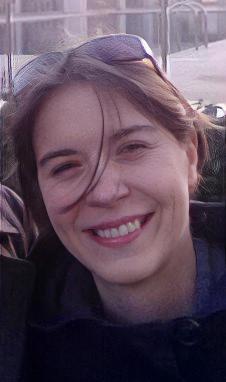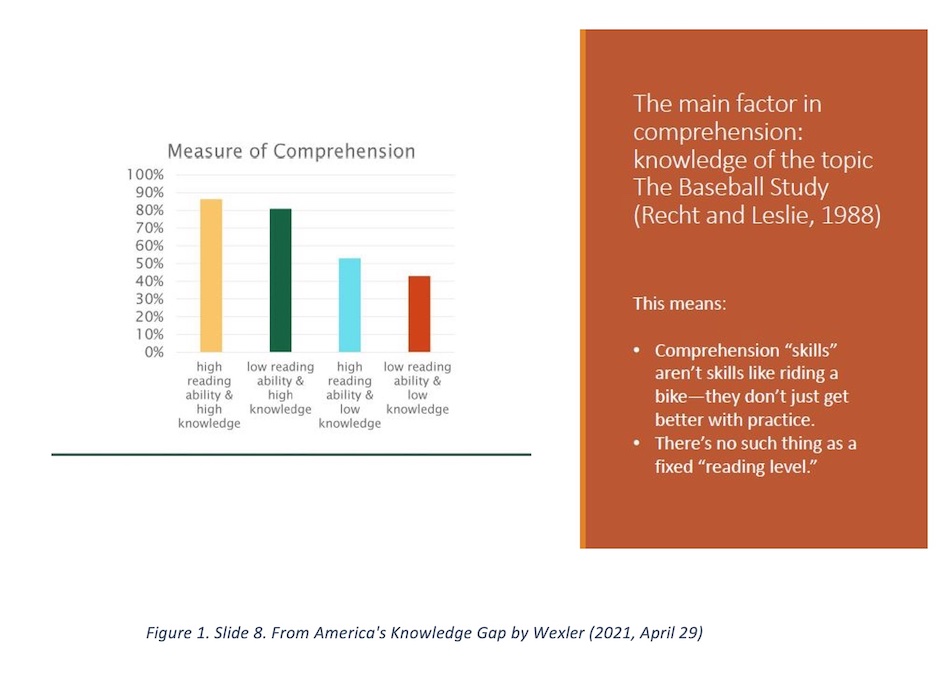The Knowledge Gap: What It Is and How to Narrow It?
The Knowledge Gap: What It Is and How to Narrow It?
by Natalie Wexler, April 29, 2021
A Reflection by Magdalena Adamczyk Söyler
 A one-hour webinar titled The Knowledge Gap: What It Is and How to Narrow It was delivered by Natalie Wexler, an American writer and a journalist whose work mainly focuses on equity issues in education and effective practices in literacy teaching. It was presented on April 29 as a part of ongoing online webinar series, The Science of Reading, and organized by Amplify, an organization which focuses on the recent developments in curriculum, assessment and intervention programs particularly at K-12 level. You can find a short biography of the presenter at the end of this blog post.
A one-hour webinar titled The Knowledge Gap: What It Is and How to Narrow It was delivered by Natalie Wexler, an American writer and a journalist whose work mainly focuses on equity issues in education and effective practices in literacy teaching. It was presented on April 29 as a part of ongoing online webinar series, The Science of Reading, and organized by Amplify, an organization which focuses on the recent developments in curriculum, assessment and intervention programs particularly at K-12 level. You can find a short biography of the presenter at the end of this blog post.
Much has been discussed on the topic of the use of prior knowledge in person’s general development and thus one’s first language (Piaget, 1968) and second language acquisition (SLA) (Marzano, 2004). This is especially true while we teach reading and listening skills, in order to make use of our background knowledge, for example, through the use of techniques such as prediction, we can easier decipher the content which is presented to us either in real life or in the outside world (Strangman & Hall, 2004). Still, I thought that in her presentation, Natalie Wexler went even further with her assumptions about background knowledge and took quite an interesting stand regarding its role in learning. What made this presentation interesting is that she puts background knowledge at the forefront of reading development way above reading strategies and techniques and that it is the true backbone of literacy development. She analyses the issue by focusing on young learners, and their transition between primary school and high school education, and thus the focus is on reading development in L1, yet the issue at hand is the extent to which background knowledge facilitates reading and the actual role reading strategies have in that process and as such, this can apply to SLA. The points which she made in her presentation might resonate with you to some extent, and strengthen your conviction in your own practices or provide an interesting point to the ongoing discussion on the effective learning and teaching practices in SLA. Below you can find a summary of her presentation.
Natalie Wexler associates the problems that occur in high school regarding disengagement and educational gaps with the inadequate focus on reading skills in primary school. Decoding is considered foundational skills and these encompass phonemic awareness, phonics and fluency (reading speed). The second aspect is comprehension, which is the main focus of this presentation. The standard approach to teaching reading is through the use of ‘skills and strategies’: identifying the main idea, cause and effect relationships, drawing conclusions, sequencing events, visualization, etc. Additionally, the books at school are categorized according to the language ‘level’ that they had been written in rather than the topic that they discuss. Recht and Leslie (1988) conducted a research called The Baseball Study and concluded that regardless of one’s reading ability, those with the high knowledge of a given topic can comprehend the written text better than those with the low background knowledge in it.

Comprehension, thus, is not like riding a bicycle and does not get better with practice, and there is no such thing as ‘fixed reading level.’ Provided that the learner is paying attention, the key lies in the working memory and how it cognitively processes new and old pieces of information in order to transfer it into the long-term memory. Here also comes into play the cognitive load and ways teachers should limit it while their learners acquire new information. What is important to note is also that without having information in the long-term memory, the learner cannot think critically about any type of content and as a result, activate higher order thinking skills.
To illustrate this problem, Wexler presents a passage from 3rd Grade PARCC Test (public school exams) and she edits out the information which may hinder reading comprehension to give a better idea of what it often feels like to read a text without having enough prior knowledge:

To see this problem from a wider perspective, the importance has been recently given into the teaching of math and reading, while sacrificing other areas such as science, art and social sciences, thus actually reducing the chances of successfully acquiring academic knowledge and vocabulary (and improving reading overall) in these fields of study. Wexler claims that while we may think our students are developing their reading at lower levels of education, through the use of certain skills and strategies such as finding the main idea, this can later not be as obvious when learners reach high school level of education. At that educational stage, they may show clear signs of struggle as the texts become more complex requiring them to activate far more background knowledge compared to previous years, and this may naturally bring about frustration in falling behind in their learning progress. With hybrid and remote learning this issue is becoming even more evident as it results in not having enough stimuli to build on one’s background knowledge.
Here are some of the suggestions that Wexler gives to narrow that knowledge gap:
•Organizing reading by topics rather than levels so that they are exposed to the same vocabulary and information repeatedly.
•Asking questions that put content rather than skills and strategies in the foreground, for example, focusing on the knowledge that helps to make inferences rather than on inferencing itself.
•Spending a lot of time on real-life social studies, art and science topics/themes/big questions.
•PD being cyclical, collaborative, periodical and rooted in content-based strategies, such as, ways of fostering critical thinking in the myth of Daedalus and Icarus.
•Relying on explicit delivery of instruction if necessary.
•Accepting that some difficulties are, in fact, ‘desirable.’
Finally, she emphasizes the concept of literacy overall and states that it does not lie in reading alone; she connects it to the listening and writing development as well, so listening is to be relied on to develop reading, through discussions and reading aloud, whereas, writing about something we don’t know much about, even on a sentence level, is even more demanding than reading about it.
About the presenter: Natalie Wexler is an American author and journalist whose work has been mainly focused on the topics of education and the reasons behind the ineffectiveness of the early education school system especially in regard to literacy skills. She also emphasizes in her writing the profound effects of the socioeconomic inequalities still vastly prevalent across communities and its impact on learners’ educational achievements. She co-authored the book called The Writing Revolution (2017) and is a solo author of the book, The Knowledge Gap (2019).
References:
Wexler, N. (2019, April 29). America’s knowledge gap [Online presentation]. Amplify Science of Reading Webinar.
Piaget, J. (1968). Piaget's point of view. International Journal of Psychology, 3(4), 281–299.
Recht, D. R., & Leslie, L. (1988). Effect of prior knowledge on good and poor readers' memory of text. Journal of Educational Psychology, 80(1), 16–20.
Marzano, R.J. (2004). Building background knowledge for academic achievement: Research on what works in schools. ASCD.
Strangman, N., Hall, T & Meyer, A. (2004). Background knowledge instruction and the implications for UDL implementation [White Paper]. National Center on Accessing the General Curriculum.
